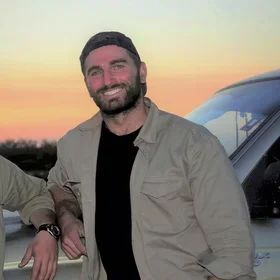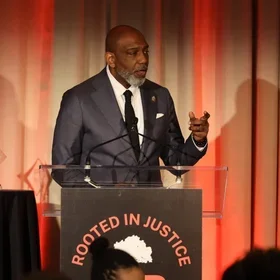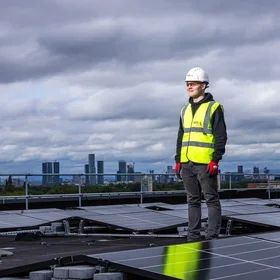When Sameer Ladha, Lecturer and Deputy Academic Director of the M.S. in Bioethics program at Columbia SPS, was diagnosed with COVID-19 earlier this year, he almost couldn’t believe it. He’d been washing his hands and practicing social distancing. But what first presented as a tickle in the throat akin to allergies quickly transformed into a mild cough, chest tightness, and body aches for several weeks. It was confirmed as a positive diagnosis through a test.
Ladha, who has since made a full recovery, recently spoke with Craig Irvine, Lecturer and Academic Director of the M.S. in Narrative Medicine program at SPS, to share his experience with COVID-19. Below is a condensed version of their conversation:
Craig Irvine: First of all, how are you feeling today?
Sameer Ladha: I’m feeling generally good and back to normal for the most part. Sometimes I do still get exhausted as there are residual effects of COVID-19 that stay around longer. That’s one of the more challenging aspects of this: We don’t really know, and that - the unknown - is too vast to get our head around. We’re still learning about the novel coronavirus. We just don’t know enough yet.
Prior to my positive diagnosis, I would watch the news to learn more about the virus as an observer, to remain healthy, to take extra caution just in case I was an asymptomatic carrier. I was following the guidelines, but looking from the outside in. But when I got the diagnosis, suddenly I was looking from the inside out. It was really strange - I would turn on the news and everything I had been interested in learning about, I no longer wanted to hear. Being on the inside, all the news is worrying, and you’re anxious. You’re hoping for the best, but you’re expecting it could get worse. You start thinking “What can I do?” And all of the sudden it hits you: “There’s really nothing I can do.”
And it’s alienating. I didn’t know anyone who had COVID-19 who I could reach out to, talk to, get a sense of their experience. You’re quarantined and you’re isolated. But, it can also be an experience that shifts your paradigm to help you gauge where you’re at in different aspects of life. Really look at yourself in the mirror, so to speak. When I got the diagnosis, it was Ramadan. I’m Muslim and I was fasting, so I was in a reflective state of mind, and this added another layer of depth as far as thinking of issues of mortality.
You’re hoping for the best, but you’re expecting it could get worse. You start thinking 'What can I do?' And all of the sudden it hits you: 'There’s really nothing I can do.' And it's alienating.
— Sameer Ladha, Deputy Academic Director, M.S. in Bioethics program
Craig Irvine: What were the first symptoms you had?
Sameer Ladha: I had a slight tickle in my throat. I thought it might be allergies. I went to sleep and when I woke up in the morning, that tickle turned into a sore throat and a slight cough and feverish feeling. I checked my temperature and it was fine, but I wanted to get tested just to be sure. They told me if these were my first symptoms, I should wait a week to take a test.
During that week, I felt fine, but I was getting tired more than I typically do. My temperature was within range but it was slightly higher than what it usually runs. There are general guidelines we hear about, but we each know ourselves as well. We know ourselves in ways we don’t even understand. I was reading something the other day about how we give attention to a lot of people in our lives, but the one person we’re with our whole life - ourself - we don’t listen to enough. That little change in temperature, the doctor would have said, “Oh, you’re totally fine,” but I knew it was not normal for me.
Then I had the test, I tested positive, and subsequently developed body aches. I woke up one morning and my back was hurting. For two days it was around my kidney area, then pain where my torso and legs meet, then to my shoulders and arms. When I felt tightness in my chest, I got a little more concerned. We read, “If you experience shortness of breath, go to the doctor,” and at that point, I wondered, “Am I experiencing shortness of breath?” And when you actually focus on your breathing, you think “Oh my God, I’m not breathing normally!” It can play mind tricks on you.
Craig Irvine: During the course of the illness, you didn’t receive additional medical treatment?
Sameer Ladha: No, thankfully. I don’t take multi-vitamins, but I did start taking Vitamin C, D, and Zinc, as well as taking Ayurvedic remedies like black onion seed, which helps with immunity. I also started drinking hot water with cinnamon, fresh ginger, turmeric, honey and lemon. That’s a common Indian concoction that helps with immune defense. Growing up, my grandmothers always had these remedies close at hand and they would encourage us to take them.
Craig Irvine: You’ve come to that point about knowing your body, which I think is so key and not stressed enough in medical treatment. The frame is the clinical frame and the expert is the doctor. That passivity is easy to fall into, so I love that you are stressing that no one knows your body like you do. Also, the effects of feeling connected to your grandmother is incalculable.
You’ve come to that point about knowing your body, which I think is so key and not stressed enough in medical treatment. The frame is the clinical frame and the expert is the doctor. That passivity is easy to fall into, so I love that you are stressing that no one knows your body like you do.
— Craig Irvine, Academic Director, M.S. in Narrative Medicine program
Sameer Ladha: Connection provides comfort because you’re going through something totally new. Finding comfort is helpful because it makes the situation more manageable. I also tried to get into a routine. I was trying to do the things I would always do to regain a sense of normality - wake up early, “go” to work, attend my meeting, exercise, and try to eat healthy.
Everyone who goes through COVID-19 has an individual experience and the spectrum of symptoms is so wide. Thankfully, I had a mild version of it, and other people may have had mild versions of it, but that does not mean we should take it mildly. My account does not reflect the majority and reflects the experience of my body - and as I know it.
Craig Irvine: Did you have to quarantine yourself in your own home from people who live with you. What was the experience like for you and them?
Sameer Ladha: I did. I quarantined from my family. I requested they move out of the area I was in. In our house, we have an upstairs, downstairs and a basement. My room is on the upstairs floor, and so they moved downstairs. For weeks I did not see them or interact with them except via phone, FaceTime and Zoom. They’d drop off food at the top of the bannister, and would regularly check in with me to make sure I was fine. My youngest brother in particular was especially concerned and always around for anything I needed. My family got tested and thankfully they are all negative.
Craig Irvine: Anything you want to add about the experience?
Sameer Ladha: A lot of times, when we have news to share with people, even if we’re talking to them in a group, we’re focusing on one person face-to-face. This has changed with Zoom. I recall telling some of my friends over Zoom, and they were in gallery view, and I was able to see all of them on one screen. As soon as I told them I had COVID-19, I saw everyone gasp. It was the strangest feeling seeing everyone’s individual, immediate reaction collectively and in real time.
My family, friends, and work colleagues have been extremely supportive, if shocked. Moments like this remind us that people who care, while they may not be walking in our shoes, nonetheless somehow help shoulder the burden. And that is a great comfort too, when you have people in your corner, rooting for you. My family has been phenomenal throughout the process, and I am deeply grateful to them.
COVID-19 also highlights a lot of inequities: deficiencies in the health care system, our allocation of resources, the question of “who should be saved when not all can?” As far as a vaccine, when that comes: how is it going to be produced, who will get it first, who should get it first? Our track record in equitably responding to crises is not good.
— Sameer Ladha, Deputy Academic Director, M.S. in Bioethics program
However, there are so many people who may not have those support systems we build over time, raising a host of issues that can impact the severity of the disease condition, from physical to mental well-being. When those systems aren’t there, they make disease management even harder. The intangibles play a huge role in our ability to overcome.
COVID-19 also highlights a lot of inequities: deficiencies in the health care system, our allocation of resources, the question of “who should be saved when not all can.” As far as a vaccine, when that comes: how is it going to be produced, who will get it first, who should get it first? Who gets it afterwards? Our track record in equitably responding to crises is not good. Unfortunately, those with privilege, power and resources are often those at the front of the line, while not necessarily being on the front line.
Craig Irvine: It reinforces that we have to be mindful of whose stories we’re listening to and whose are not being told.
Sameer Ladha: It is high time we do that. 2020 has been such a strange year already. None of us imagined the unrest we’d face in all aspects of our lives. The fact that this pandemic emerged the way it did, the way it slammed us, it is unbelievable. And there have been other very serious issues that have surfaced as well, like the devastating death of George Floyd and what that has highlighted about the experiences of Black people in the United States.
The Black Lives Matter movement right now and the COVID-19 pandemic and all the interwoven issues in these two phenomena speak to matters we have not handled well. I think we need to remember that and turn to the difficult moments we have experienced over the last few months - those scary, uncomfortable, very real instances - and rely on them as transformative. In a sense to revisit the terror, injustice and discomfort of those times. Those are the moments when our deepest anxieties present themselves. Those are the moments we need to remind ourselves of. And not just that “I got over this” or “I got better” or “we made it through,” but rather as moments that propel us and compel us to be better. That’s incumbent on all of us.
To read more COVID-19-related content, please take a look at SPS’ COVID-19 Insights & Information Hub for news, insights, and virtual events.


